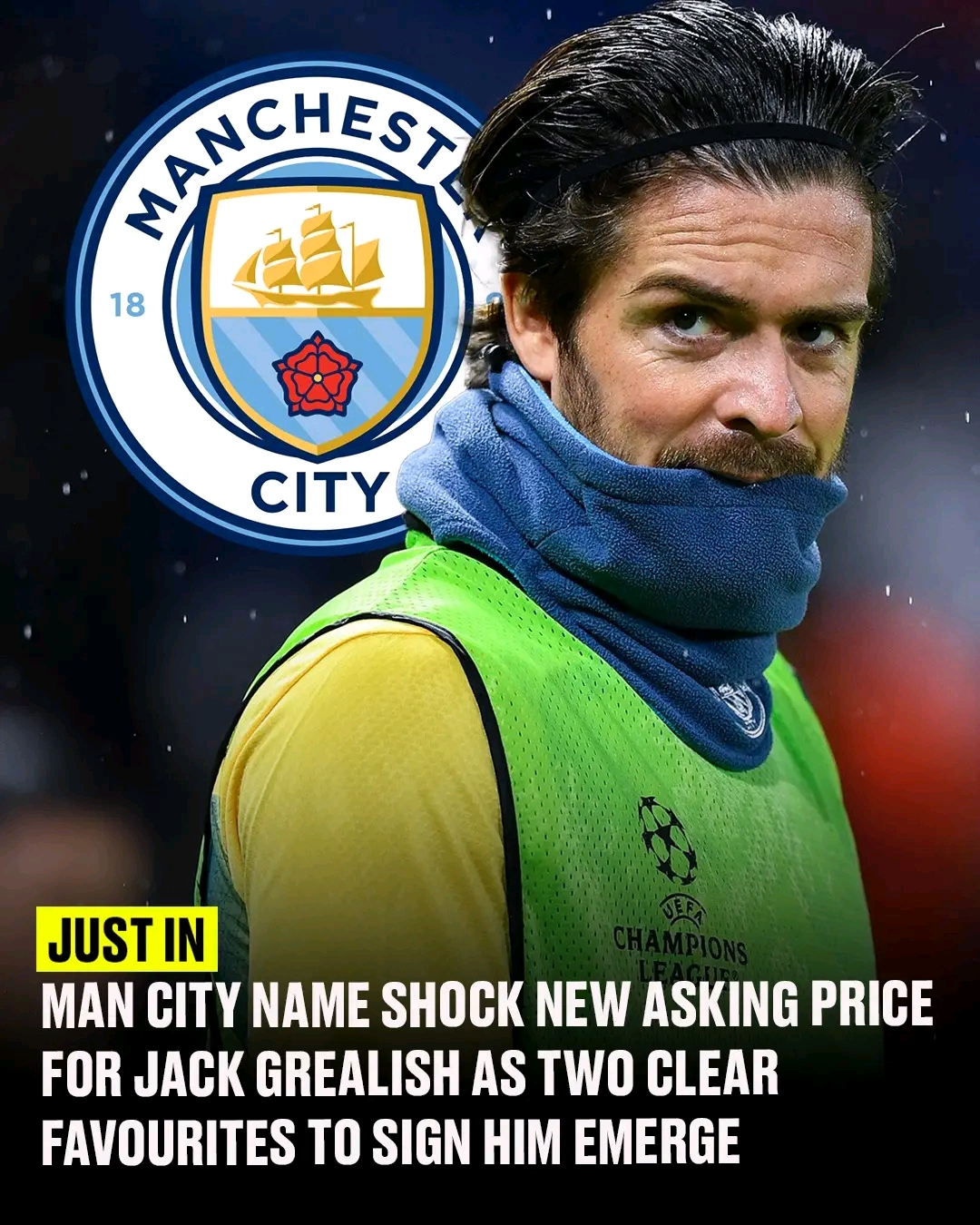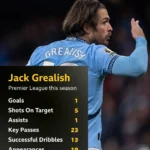Jack Grealish Transfer Saga: Manchester City’s Strategic Rebuild

The summer transfer window has brought unexpected developments to Manchester City’s squad planning, with England international Jack Grealish emerging as a potential departure from the Etihad Stadium. The club’s £40 million asking price for the winger has sent shockwaves through the football world, particularly given the substantial investment City made when they acquired him from Aston Villa in 2021 for a then-British record fee of £100 million
Manchester City’s decision to potentially part ways with Grealish must be viewed through the lens of their underwhelming 2024/25 campaign. For a club accustomed to silverware and domestic dominance, the past season represented a significant departure from their usual standards. The Citizens’ failure to retain their Premier League title, which slipped away to Liverpool, marked a pivotal moment in Pep Guardiola’s tenure at the club.
The disappointment extended beyond domestic competitions. City’s Champions League campaign, which has been their Holy Grail in recent years, once again ended in heartbreak. Despite years of investment and tactical refinement, European glory continues to elude them. The FA Cup final defeat against Crystal Palace at Wembley in May served as a bitter conclusion to what many considered a transitional season for the club. These setbacks have forced City’s hierarchy to reassess their squad composition and strategic direction. The summer transfer window represents more than just routine player trading; it’s an opportunity for comprehensive squad renovation. With Financial Fair Play regulations continuing to influence transfer activities, City must balance their ambitions with fiscal responsibility, making player sales a crucial component of their summer strategy.
Jack Grealish’s Manchester City career has been marked by periods of brilliance overshadowed by inconsistency and injuries. The 29-year-old’s 2024/25 season statistics paint a concerning picture for a player of his caliber and market value. With just 20 Premier League appearances, one goal, and one assist, Grealish’s output fell dramatically short of expectations placed upon him as one of the league’s most expensive signings.
The England international’s reduced playing time under Guardiola has become increasingly apparent. His exclusion from City’s Club World Cup squad raised eyebrows throughout the football community, though the Spanish manager was quick to clarify that the decision was purely tactical rather than disciplinary. Guardiola’s public statements about Grealish have consistently emphasized the player’s quality while acknowledging the competitive nature of City’s attacking options. The winger’s struggles extend beyond mere statistics. His inability to consistently secure a starting position in Guardiola’s system has raised questions about his tactical fit within City’s structured approach. While Grealish’s individual brilliance remains undeniable, his integration into City’s collective philosophy has proven more challenging than initially anticipated
City’s £40 million asking price for Grealish represents a significant depreciation from their original investment, yet it reflects the current market realities and the player’s recent form. This valuation strategy appears designed to attract serious interest while ensuring City can recoup a substantial portion of their investment. The pricing also suggests that City are genuinely open to sanctioning Grealish’s departure, rather than merely testing the market.
The £40 million figure places Grealish in an interesting market position. While it’s a substantial fee that will limit potential suitors, it’s not so prohibitive as to deter ambitious clubs seeking to add proven Premier League quality to their squads. This pricing strategy indicates City’s desire to facilitate a move while maintaining their financial position. For potential buyers, the fee represents an opportunity to acquire a player with undeniable talent and Premier League experience. Despite his struggles at City, Grealish’s reputation as a game-changer and his proven ability to perform in high-pressure situations make him an attractive proposition for clubs looking to strengthen their attacking options.
According to betting odds and transfer speculation, Napoli and Tottenham have emerged as the frontrunners in the race to secure Grealish’s signature. Both clubs represent compelling destinations for different reasons, offering the winger distinct pathways to revitalize his career.
Napoli’s interest in Grealish aligns with their ambitions to remain competitive in Serie A and European competitions. The Italian giants have shown a willingness to invest in proven talent, and Grealish’s creativity and flair would complement their attacking philosophy. The prospect of playing in Serie A could provide Grealish with a fresh challenge and the opportunity to showcase his abilities in a different tactical environment.
Tottenham’s potential pursuit of Grealish represents a more complex proposition. The North London club’s inconsistent form and managerial changes have created uncertainty about their long-term project. However, Spurs’ ambition to challenge for European qualification and their need for creative spark make Grealish an appealing target. The opportunity to remain in the Premier League while potentially securing more regular playing time could prove attractive to the England international. Both clubs offer Grealish the chance to be a central figure in their attacking plans, something that has been lacking during his time at City. The prospect of being a key player rather than a squad rotation option could be decisive in determining his next destination
Grealish’s potential departure from City occurs within a broader context of significant transfer activity across the Premier League. The market has been characterized by clubs seeking to balance their books while strengthening their squads, leading to some surprising valuations and unexpected player movements.
The comparison with Marcus Rashford’s situation at Manchester United provides an interesting parallel. Both players have seen their stock fluctuate dramatically, with United reportedly valuing Rashford at a similar £40 million despite his loan move to Aston Villa. These valuations reflect the premium placed on proven Premier League performers, even when their recent form has been inconsistent.
The transfer market’s evolution has also been influenced by Financial Fair Play considerations and the economic impact of recent global events. Clubs are increasingly strategic in their approach to player trading, seeking to maximize value while adhering to regulatory constraints. This environment has created opportunities for clubs to acquire quality players at potentially reduced prices.
Pep Guardiola’s tactical preferences have evolved throughout his tenure at Manchester City, and these changes have had significant implications for certain players, including Grealish. The Spanish manager’s system demands specific attributes from wide players, including defensive discipline, positional awareness, and the ability to operate in tight spaces.
While Grealish possesses exceptional individual skill and creativity, his natural playing style doesn’t always align perfectly with Guardiola’s systematic approach. The manager’s preference for players who can seamlessly integrate into his tactical framework has meant that Grealish’s unique abilities haven’t always been fully utilized within the team structure.
Guardiola’s recent comments about Grealish have been notably supportive, emphasizing the player’s quality and contribution to City’s treble-winning campaign. However, the manager’s willingness to allow Grealish to leave suggests a recognition that both parties might benefit from a change of scenery. This mutual understanding could facilitate a smoother transition for all involved.
Grealish’s status as an England international adds another layer of complexity to his transfer situation. With major tournaments on the horizon, regular playing time becomes crucial for maintaining his position in the national team setup. His reduced role at City has already impacted his international prospects, making a move to a club where he can secure consistent minutes increasingly important.
The England national team’s depth in attacking positions means that Grealish faces intense competition for squad places. Players like Bukayo Saka, Phil Foden, and Jarrod Bowen have all established themselves as key figures in Gareth Southgate’s setup, putting additional pressure on Grealish to perform at club level.
A successful transfer to a club where he can be a regular starter could significantly boost Grealish’s international prospects. The opportunity to showcase his abilities on a consistent basis would provide England’s coaching staff with a clearer picture of his current form and fitness levels.
Manchester City’s decision to price Grealish at £40 million reflects broader financial considerations that extend beyond the immediate transfer fee. The club’s need to balance their books while funding new signings has made player sales a crucial component of their summer strategy.
The potential sale of Grealish would provide City with significant funds to invest in other areas of their squad. With Guardiola likely to target specific positions for reinforcement, the proceeds from Grealish’s sale could facilitate the acquisition of players better suited to the manager’s current tactical vision. For City’s long-term planning, moving on from Grealish represents an opportunity to reset their attacking options. The club’s academy system and scouting network have consistently identified promising talent, and the funds generated from Grealish’s sale could be reinvested in younger players with higher potential ceiling.
From Grealish’s perspective, the potential move represents a critical juncture in his career. At 29, he’s entering what should be his prime years, yet his limited playing time at City has prevented him from consistently demonstrating his abilities at the highest level. The opportunity to join a club where he can be a central figure in their attacking play could reinvigorate his career. Whether at Napoli, Tottenham, or another interested party, Grealish would likely be guaranteed a more prominent role than he currently enjoys at City. The financial aspects of any potential move will also be significant for Grealish. While he may need to accept a reduction in wages compared to his current City contract, the opportunity for regular playing time and career progression could outweigh purely financial considerations.
The Jack Grealish transfer saga represents more than just a routine player sale; it’s a defining moment for Manchester City’s squad evolution, the player’s career trajectory, and the broader Premier League transfer market. City’s £40 million asking price reflects their pragmatic approach to squad management while acknowledging the need for strategic change.
For Grealish, the summer represents an opportunity to reignite his career and secure the regular playing time that has been elusive at City. The interest from clubs like Napoli and Tottenham suggests that his talent remains highly regarded despite his recent struggles.
As the transfer window progresses, the resolution of Grealish’s situation will likely influence City’s broader transfer strategy and provide insights into Guardiola’s tactical evolution. Whether the England international remains at the Etihad or embarks on a new chapter elsewhere, his decision will have far-reaching implications for all parties involved.
The coming weeks will be crucial in determining whether City’s valuation proves realistic and whether Grealish can find a destination that offers him the platform to showcase his undeniable talent. Whatever the outcome, this transfer saga serves as a fascinating case study in modern football’s complex intersection of tactics, finance, and player development.















